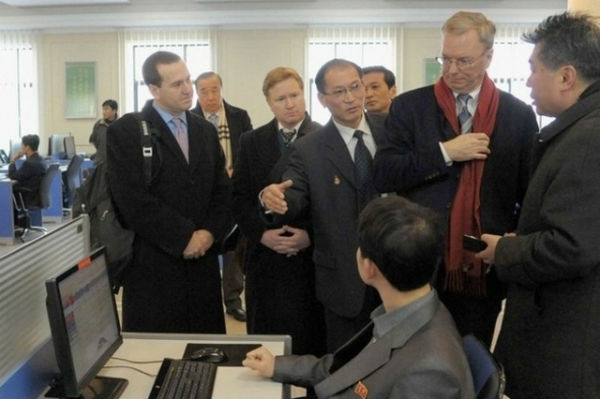Affiliate links on Android Authority may earn us a commission. Learn more.
Why did Eric Schmidt go to North Korea?
Published onJanuary 20, 2013

Chairman and former CEO of Google Eric Schmidt recently travelled to North Korea on a fact-finding mission of sorts. Schmidt wanted to ascertain how North Korea utilizes the Internet and see for himself just how restrictive it is. The information he shared was startling, but interesting. A country as large and powerful as North Korea is far behind many of its peers, and that could be troubling.
But why go to a communist country? Travel to North Korea is difficult at best, so why take the chance? We also have to wonder why Google cares about how North Korea uses the Internet. Sure, the company is a tech giant and search magnate, but North Korea represents such a small fraction of potential world online traffic. As much as we can learn from what Schmidt reported back, we can also infer that North Korea is indicative of a larger problem for Google.
Why North Korea?
As much as I’d love to leave politics out of this discussion, it’s not possible to do so with a communist nation in reference to openly sharing information. Although called the “Democratic People’s Republic of North Korea,” or DPRK, it’s anything but democratic. Communism is restrictive by nature, and that includes information. With the passing of Kim Jong Il and the rise to power of his son Kim Jong Un, a few problems were exposed. North Korea is a severely depressed nation, and its people face a variety of serious problems daily. While using the Internet for information is probably a distant afterthought for many citizens, it’s a concern for a company like Google. In North Korea, you have a very good example of a larger problem for Google.
It’s important to mention that Schmidt didn’t travel alone. Former Governor of New Mexico Bill Richardson was his guide and he travelled in a delegation alongside eight other members.
A former UN ambassador, Richardson was in North Korea on a humanitarian mission in response to North Korea’s launching of long range missiles late last year. The White House referred to that trip as “ unsuccessful,” unfortunately. It’s also worth note that Richardson no longer enjoys any official political capacity, so this was a private trip.

A rock star
Richardson described Schmidt’s reception as that of a “rock star”, which sheds a little light on just how important this issue of an open Internet really is. Sure it’s just the Internet, but it represents so much more than that. Right now in North Korea, the Internet is only available to a select few: the government, the military and universities. That’s representative of an intranet, which is basically what its technology is. Schmidt notes that there is a “supervised” Internet, which means “that people were not able to use the Internet without someone else watching them”.
Schmidt also found that, despite the walled-off nature of technology in North Korea, it would be very simple for the country to “turn the Internet on”, as he puts it. From his Google+ page, Schmidt writes:
There is a 3G network that is a joint venture with an Egyptian company called Orascom. It is a 2100 Megahertz SMS-based technology network, that does not, for example, allow users to have a data connection and use smart phones. It would be very easy for them to turn the Internet on for this 3G network. Estimates are that are about a million and a half phones in the DPRK with some growth planned in the near future.

Dollars and sense
For Google, North Korea represents a roadblock for something that is very important to the company: the free and open Internet. Whether or not you’re familiar with the recent issues surrounding this cause, it’s worth understanding that Google is fervently behind the issue. Mostly because it’s the right thing to, but also because its business model is based on it. We visit Google.com, then enter what we want to know about in the search bar. The results pop up and so do some unobtrusively placed ads. We click on the ads, and Google makes money.
In entering a new frontier of search and services, Google is committed to being a mobile-conscious company. The desktop will always be there, but the world is increasingly mobile. A system like that of North Korea, which operates in such a limited space, concerns Google. How will it drive revenue from a restricted system? More importantly, will this catch on anywhere else?
With such a large number of North Koreans unable to access the Internet freely, there is little reason to have devices to access it. An open flow of information is the linchpin to just about everything Google does from selling devices to creating services. If I can’t access the Internet, what good is a device that has such features?
Was the visit worth it?
Educationally, yes. Schmidt learned quite a bit, it seems, about how North Korea operates in regard to treatment of technology. Obviously driving revenue is a concern for Google, but the issue is deeper that that. This is ultimately about the transfer and open sharing of information. Eric Schmidt may represent the largest search (and arguably the largest tech) company on earth, but I’ll not believe his trip was strictly business. To really understand the situation, it was important for him to see first-hand just what was going on. Schmidt himself said the North Koreans “listened and asked questions,” so they are at least open to being open. The focus is a free and open Internet, and North Korea simply doesn’t have it right now.
Why should we care?
In discussing this issue, we’re remiss to place too much emphasis on the sensational facts: North Korea and communism. They are worth consideration, because in essence communism is the heart of the matter. While I don’t subscribe to a communist mindset, I respect those that do and their belief in that system. For free transfer of information, however, old-line communism simply doesn’t work.
North Korea, like just about any nation on earth, is filled with very bright people doing important work. The open transfer of information can only help the world community. Being able to openly discuss things such as medical research will drive both sides of the equation. Perhaps there is a botanist in North Korea that can analyze cancer research from Scotland, then identify some rare plant to help reduce its spread. While that may be a made-for-TV scenario, it’s also worth exploring.
The definition of “www” is World Wide Web. Without a free and open Internet for all, that simply isn’t true. North Korea is indicative of a problem, sure, but not the problem. North Korea confounds us because it’s a fairly advanced nation that has left an important factor behind: information, We may openly question why it does this, as it seems obtuse, but there is something we should all keep in mind when considering why North Korea resists the sharing of information.
Communism
I live in a democratic nation, as most people do. In the world outside of North Korea, quite a bit of anti-communist opinion and rhetoric is shared. We must respect that North Korea is a communist country, and for them, reducing the flow of anti-communist talk is impossible. This is why it eliminates the open flow of information altogether. We may or may not agree on its politics, but let’s try to appreciate and respect its belief system.
An open Internet could create panic in North Korea, and that’s not something it needs right now. North Korea is a country faced with widespread famine, poverty, among other various economical and human rights issues. The last thing it can really afford is dissension amongst citizens. Communism has the capacity to change, especially with a shift in power to Kim Jong Un, so we can hope for the people of North Korea that a renaissance of sorts is on the horizon.
Controlling the chaos
Change is never easy. To achieve the goal of a truly free and open Internet, some type of change must occur. North Korea, for its own reasons we only partly understand, chooses to limit or exclude information to its people. In Eric Schmidt visiting the country, it’s fair to say that excluding or otherwise leaving North Korea behind is in nobody’s best interest. Such a rich culture with a lot of potential for positive change should be welcome to join the fight for the open exchange of information, and they are.
A free and open Internet should be for everyone who wants it, not everyone who is allowed to access it. In considering an open exchange of information, North Korea will have to ponder a new way of communism as well. If the current political environment doesn’t lend itself to freely sharing information, what will? Can North Korea adopt a communist country in which information is available at-will? I believe so. Belief is at the core of every great concept, and North Korea simply has to believe it can forge a new path.

The remains of the day
The Chairman and former CEO of one of the largest companies ever visiting a communist country in this day and age is monumental. He didn’t stay long, or necessarily achieve anything, but the lessons were invaluable. A body of information that shows opportunity is there, but not being realized. Google’s ever-present mantra is “don’t be evil,” so we can safely assume this visit had only the purest of aspirations. Google has never hidden its intentions in generating revenue, nor does it make it the driving force of its dealings. Doing the right thing will bring the money eventually, and it understands that.
While the trip was important and poignant, it could have been for naught. Schmidt’s daughter and travelling companion, Sophie, has a Google Sites blog detailing the trip. It sheds a different light on the trip than Eric’s carefully measured feedback, and suggests at a dog-and-pony show orchestrated by North Korea. If what she saw was truly staged rather than carefully measured presentation, it doesn’t bode well for the people of North Korea in having access to information any time soon.
The concept of a free and open Internet is a strict juxtaposition to the core concepts of communism. Like any concept, idea, or belief, communism is adaptable to change. The world has evolved in a way few people thought it could over the past decade or so. We have more knowledge at our fingertips than we ever thought we would, and a truly global community. If North Korea would include itself as we all hope it will, it would be a beacon for change and a signal of hope. Eric Schmidt opened the door, so let’s hope North Korea sees fit to come outside. The playground is open.